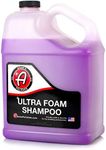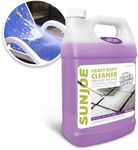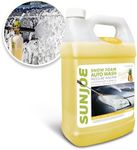Buying Guide for the Best Car Wash Soap For Pressure Washer
Choosing the right car wash soap for your pressure washer can make a big difference in how clean your car gets and how well you protect its finish. The right soap will help remove dirt, grime, and road film without damaging your paint or leaving streaks. When shopping, it's important to look at a few key features to make sure the soap is safe for your car, works well with your pressure washer, and meets your cleaning needs.Soap ConcentrationSoap concentration refers to how much the soap needs to be diluted before use. Highly concentrated soaps require you to mix a small amount with water, while ready-to-use soaps can be applied directly. Concentrated soaps are often more economical and allow you to adjust the strength for different cleaning jobs, but they require careful mixing. If you want convenience, a ready-to-use formula is easier, but if you want flexibility and value, a concentrated soap is a better choice. Think about how much effort you want to put into mixing and how often you plan to wash your car.
Compatibility with Pressure WashersNot all car wash soaps are designed to work with pressure washers. Some are made specifically for use with these machines, meaning they produce the right amount of foam and rinse off easily. Using a soap not meant for pressure washers can cause clogging or poor cleaning results. Always check if the soap is labeled as pressure washer compatible. If you use a pressure washer regularly, make sure to pick a soap that is designed for it to avoid equipment issues and get the best cleaning performance.
pH LevelThe pH level of a car wash soap tells you how acidic or alkaline it is. A neutral pH (around 7) is gentle on your car’s paint, wax, and sealants, while more acidic or alkaline soaps can strip away protective layers or cause damage over time. For regular car washing, a pH-neutral soap is safest and helps maintain your car’s finish. If you need to remove tough grime or old wax, a slightly higher or lower pH might be useful, but for most people, sticking with a neutral pH is the best way to protect your vehicle.
Foaming AbilityFoaming ability refers to how much lather the soap creates when used with a pressure washer. Good foam helps lift dirt off the surface and makes it easier to rinse away without scratching the paint. Some soaps are designed to create thick, clinging foam, while others produce lighter suds. If you want a deep clean and enjoy the visual effect of lots of foam, look for a high-foaming soap. If you prefer a quicker wash or have a pressure washer with lower foam output, a standard foaming soap will do the job.
Residue and RinsingSome car wash soaps rinse off cleanly, leaving no residue, while others may leave streaks or spots if not rinsed thoroughly. A soap that rinses easily saves you time and prevents water spots or film from forming on your car. If you live in an area with hard water or want a spotless finish, look for a soap that is specifically labeled as 'no residue' or 'spot-free.' This is especially important if you want your car to look its best after every wash.
Surface SafetySurface safety means the soap is safe to use on all parts of your car, including paint, glass, plastic, and rubber. Some soaps are formulated only for painted surfaces, while others are safe for wheels, trim, and even convertible tops. If you plan to wash your whole car with the same soap, make sure it’s labeled as safe for all surfaces. This helps you avoid accidental damage and makes the washing process simpler.
Environmental FriendlinessEnvironmental friendliness refers to whether the soap is biodegradable and free from harsh chemicals that can harm plants, animals, or water systems. If you wash your car in your driveway or near grass, choosing an eco-friendly soap helps protect the environment. Look for soaps labeled as biodegradable or environmentally safe if this is important to you.















